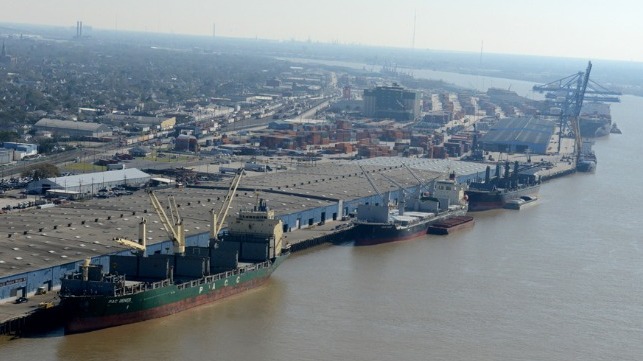
Efforts are continuing to provide liquefied natural gas (LNG) fueling solutions to ship owners and operators along the Gulf Coast of the U.S. In the latest development, the Port of New Orleans announced that it has entered into a memorandum of understanding with CLEANCOR Energy Solutions, a subsidiary of SEACOR Holdings, to collaborate on the development of LNG supply within the port. CLEANCOR will work with Port NOLA to help provide LNG to the port’s customers and marine operators.
“We are pleased to partner with CLEANCOR to ensure we provide Port NOLA tenants and customers with the best options for the most efficient and effective operations,” said Brandy D. Christian, President and CEO Port NOLA and CEO of the New Orleans Public Belt Railroad. “LNG paves the way of the future and provides a suitable and sustainable fuel source for the diverse cargo operations on our terminals and in our jurisdiction.”
In collaboration with Port NOLA, CLEANCOR will develop options for infrastructure development that integrate into Port NOLA’s long-range planning as well as work to educate Port NOLA customers and other local stakeholders regarding the environmental and financial benefits of LNG bunkering. CLEANCOR will also provide options for LNG bunkering that are compatible with forecasted customer demand and collaborate with Port NOLA to obtain Federal, state, and other authorizations and permits needed to develop the required infrastructure and operations.
“Our mission is to accelerate the adoption of low carbon fueling solutions and this constitutes an exciting opportunity to not only advance the region’s first such project but also to contribute to the decarbonization of the maritime sector,” said Jeff Woods, CEO CLEANCOR.”
While the partners plan to pursue the development of LNG capabilities to support the expansion of the port, no time was offered for when the LNG bunker might become available.
NOLA joins other ports along the Gulf Coast that are working to develop LNG bunkering. Recently both the ports of Galveston and Corpus Christi in Texas announced that they had also entered into agreements to introduce LNG bunkering capabilities. The Port of Galveston and Stabilis Solutions expect to have their operations available before the end of 2021, while Stabilis Solutions is working with Corpus Christi to construct an LNG fueling infrastructure as they seek to expand the port’s support of the decarbonization efforts by the maritime industry.
SOURCE READ THE FULL ARTICLE
https://www.maritime-executive.com/article/port-of-new-orleans-becomes-latest-to-plan-lng-bunkering-on-gulf-coast